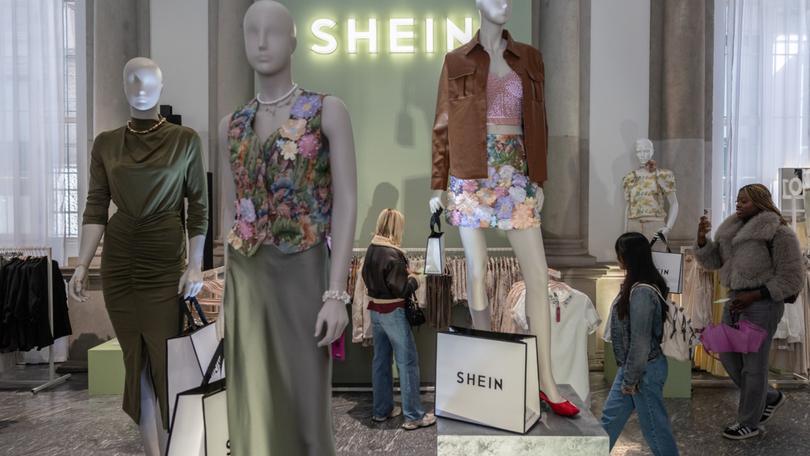THE ECONOMIST: Will China cheapies Shein and Temu survive? Online shopping giants caught in Trump’s trade war
China cheapies Shein and Temu’s survival is on the line after the online shopping giants were caught up in Trump’s trade war.

For gen Z shoppers in America, Donald Trump’s trade war with China is no longer just a headline. On April 25 Shein and Temu, two Chinese online emporiums popular among youngsters, announced they would be adjusting their prices in America.
The cost of some goods sold by Shein subsequently shot up by more than 150 per cent. Temu has added “import charges” that in some cases exceed the price of the item being purchased.
Those moves come ahead of America’s elimination on May 2 of the de minimis exemption for Chinese wares, which hitherto spared packages valued below $US800 ($1247) from tariffs. Chinese companies, including Shein and Temu, sold around $US50 billion worth of goods in America under the exemption last year — equal to about 11 per cent of all Chinese exports to the country.
Sign up to The Nightly's newsletters.
Get the first look at the digital newspaper, curated daily stories and breaking headlines delivered to your inbox.
By continuing you agree to our Terms and Privacy Policy.If sent through the postal service, these packages will now incur either a 120 per cent tariff or a flat fee of $US100, rising to $US200 in June. (Most Chinese products shipped to America via other means will be subject to the higher rate of 145 per cent.)
The change will weigh heavily on e-commerce’s two rising stars. Although Shein and Temu’s clever algorithms have contributed to their success, by far the biggest force propelling their ascent has been their strikingly low prices, with shirts from as little as $US3 and backpacks from just $US5.
By shipping goods directly from Chinese factories to foreign consumers, they have bypassed multinational companies and their hefty markups while also avoiding customs duties. America has been the most important market for their wares, estimated to account for around 30 per cent of Shein’s sales and 40 per cent of Temu’s.

Can their business model survive the breakdown of trade relations between the world’s two largest economies?
Not long ago Shein and Temu looked unstoppable. In 2022 Shein was valued at $US100b. That was the year it overtook H&M and Zara to become the world’s largest seller of fast-fashion.
It was also the year that Temu, another Chinese e-commerce firm that sells clothing and various other goods, launched in America and shot to prominence with an advertising blitz promising that its customers would “shop like a billionaire”.
Now the pair find themselves caught in the middle of a trade war. Shein, which had originally hoped to list in New York, was recently granted approval for an initial public offering in London.
Its valuation, however, is said to have tumbled to around $US50b, and it is unclear if or when it will go through with the listing.
Making up for the probable loss of sales in America will be difficult. Both firms have already been trying to diversify into new markets. In the first half of last year Temu began spending more on ads outside than inside America.
By the start of this year Shein had followed suit. Both companies appear to be focusing on European markets including Britain, France, Germany, Italy and Spain.
But some of these countries are also now considering slapping duties on small parcels. And expanding in Asia has been tough. In December regulators in Vietnam forced both companies to halt their sales in the country over concerns they were peddling counterfeit goods. Temu’s app has been blocked in Indonesia to shield local merchants from Chinese competition.
Shifting production out of China will be no easier. Shein and Temu’s ability to source cheap goods quickly relies on China’s well-oiled supply chains. Both source most of their wares from the southern manufacturing province of Guangdong. Shein in particular depends on a cluster of clothing manufacturers in a single district in the city of Guangzhou.
Temu has moved more quickly to expand its sourcing in south-east Asia and Mexico — though Morningstar, a financial-services firm, thinks that by the end of the year only around 15 per cent of its goods will come from outside China.
The companies are also trying to change how they do business in America. Temu has been promoting what it calls “local-to-local” business, where shoppers purchase goods from companies based in America. Yet most of these merchants are Chinese companies that have set up shop abroad and use traditional shipping to import their goods.
They, too, will be clobbered by Mr Trump’s tariffs. Some merchants might instead test the mettle of America’s customs officials by first shipping products from China to countries such as Vietnam.

Insiders note that both Shein and Temu have been bracing for a shock to their business model for some time. A large plant on the outskirts of Shenzhen that packages air shipments for the two companies relies heavily on human labour, rather than investing in automation, owing to the risk that shipments to America might suddenly collapse, according to a person familiar with its operations.
As the trade war weighs on China’s economy, its government could make it harder for Shein and Temu to move their supply chains. A survey of purchasing managers suggests that Chinese manufacturing activity contracted in April and, after a boom in 2024, airports are bracing for a sharp fall in air cargo heading to America.
According to Bloomberg, China’s ministry of commerce recently told Shein to stop trying to diversify its supply chain away from the country. Rumours that the firm was seeking manufacturers abroad led Guangzhou’s municipal government to release a statement insisting that the city was still at the core of Shein’s supply chain.
The Chinese government has leverage over the two firms. Although Temu has grown quickly, PDD, its parent company, remains heavily dependent on its Chinese business, Pinduoduo. Shein does not sell its wares in the country, but it does rely on Chinese tech talent for its algorithm.
Both Shein and Temu like to downplay their connections to China. Shein says it is a global company headquartered in Singapore; Temu goes so far as to say it is American, with its head office in Boston.
Yet for now they remain as tethered to China for their supply chains as they are to America for their sales.
To survive, they will have to find ways to become more global. Mr Trump’s trade war might end up making true multinationals out of them yet.
Originally published as Can Shein and Temu survive Trump’s trade war?
